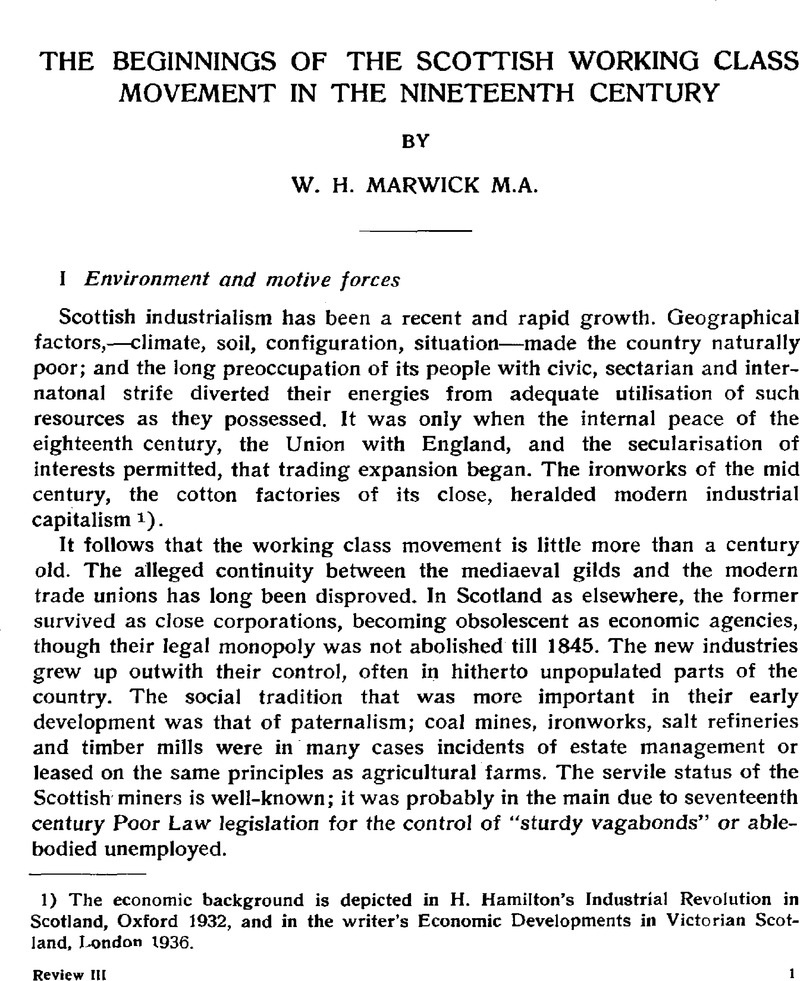No CrossRef data available.
Article contents
The beginnings of the Scottish working class movement in the nineteenth century
Published online by Cambridge University Press: 18 December 2008
Abstract

- Type
- Articles
- Information
- Copyright
- Copyright © Internationaal Instituut voor Sociale Geschiedenis 1938
References
page 1 note 1) The economic background is depicted in H. Hamilton's Industrial Revolution in Scotland, Oxford 1932, and in the writer's Economic Developments in Victorian Scotland, London 1936.
page 2 note 1) For instances, see Galton, F. W. (ed.), The Tailoring Trade, London 1896, and Malcolm, C. A. (ed.), Minutes of J. P.s of Lanarkshire, 1707—23, Edinburgh 1932.Google Scholar
page 2 note 2) For the political principles of Presbyterianism, see Macpherson, H., The Covenanters under Persecution, Edinburgh 1923;Google Scholar its social ethic is discussed in Robertson, H. M., Rise of Economic Individualism, Cambridge 1933.Google Scholar
page 3 note 1) The matter is fully discussed by Gray, J. L., Law of Combination in Scotland, Economica, 12 1928. cf. Evidence before Select Committees on Artisans (1824) and on Combination Laws (1825).Google Scholar
page 4 note 1) cf. Reports of Handloom Weavers Commissions, 1839 and 1841; “Sir John Maxwell”, Scottish Educational Journal, 02 12, 1932.Google Scholar
page 4 note 2) Details are given in Swinton, A., Trial of Cotton Spinners, 1838; Marshall, J., Trial of Cotton Spinners, 1838; Reports of Factory Inquiry Commission 1833 and of Select Committee on Trade Unions 1838.Google Scholar
page 5 note 1) Cf.Postgate, R. W., The Builders History, London n.d. The Minute Book of the Edinburgh Carpenters is now in the National Library of Scotland.Google Scholar
page 5 note 2) Campbell is mentioned in most books dealing with trade unionism and cooperation; a sketch of his career appeared in the Scottish Educational Journal, February 26, 1932.
page 6 note 1) A complete file of the Herald to the Trades Advocate is in the Mitchell Library, Glasgow; the Reformers Gazette is useful for this period; it is in the Baillie Library, Glasgow, as is Campbell's account of his trial. Only a single copy of the Liberator is known to survive, in the British Museum Newsroom, Colindale, and also of the Tradesman in the Mitchell Library, Glasgow.Google Scholar
page 6 note 2) The best modern account of the political reform movement is Meikle, H. W., Scotland and the French Revolution, Glasgow 1912. For the whole century, Johnston's, T. History of the Working Classes in Scotland, Glasgow 1920, though badly arranged and documented and sometimes inaccurate in detail, is invaluable.Google Scholar
page 7 note 1) Biographical sketches of Atkinson, and Mills, were published in the Scottish Educational Journal, 06 23, 1933 and 06 7, 1935.Google Scholar
page 8 note 1) References to Taylor in the standard works are casual and sometimes incorrect. His career is sketched in the Glasgow Herald, 09 23, 1933.Google Scholar
page 8 note 2) The Monthly Democrat (incomplete) is in the National Library of Scotland; the True Scotsman in Paisley Burgh Library.
page 8 note 3) ct. “Patrick Brewster”, Scottish Educational Journal, 10 10, 1930.Google Scholar
page 9 note 1) A complete file of the Scottish Chartist Circular is in the Mitchell Library, Glasgow; of the Scottish Patriot in the National Library of Scotland; both are principal sources for the period, for which the more orthodox press, e.g. Glasgow Argus, Edinburgh Advertiser, is also useful. The standard works of Beer, Dolléans, Hovell and West, and Reg. Groves have references to the Scottish movement, but hardly realise its distinctive features.
page 11 note 1) For biographical details see “Some Scottish Chartist Leaders”, Glasgow Herald, 02 10, 1934.Google Scholar
page 12 note 1) loc. cit.
page 13 note 1) cf. “P. E. Dove”, Scottish Educational Journal, 09 8, 1933.Google Scholar
page 14 note 1) The Glasgow Sentinel was published weekly from 1850 to 1876; a complete file is in the British Museum Newsroom. It is the most adequate authority for the period of its issue. The radical North British Daily Mail (1851—1901) in Mitchell Library, is useful for the latter half of the century.
page 15 note 1) MacDonald's, career is summarised in Scottish Educational Journal 03 4, 1932; a thesis on it is being prepared in the University of Chicago.Google Scholar
page 17 note 1) For trade unionism in this period, references in Webb, Johnston and Postgate have been supplemented from the contemporary press, from Reports of Government Committees, especially the Children's Employment Commission 1864, Commissions on Trade Unionism 1867–69, on Truck 1871, and on the Master and Servant Acts 1874–75. The records of Edinburgh Trades Council are almost completely extant from its origin.
page 17 note 2) Sir W. Maxwell's History of Cooperation in Scotland, Glasgow 1910 is the classic; a briefer survey is given in J. Lucas, Cooperation in Scotland, Manchester 1920, cf., B. Jones, Cooperative Production, Oxford 1894.Google Scholar
page 18 note 1) Chalmers' prolix theorising is conveniently summarised in Dr. Wilson Harper's Social Ideal and Dr. Chalmers' Contribution, Edinburgh 1910. For the church attitude to social problems, see also DrFleming's, J. R. brief but excellent survey in History of Church in Scotland 1843–1874, Edinburgh 1927, and Carswell's, D. sardonic Brother Scots, London 1927. Biographical sketches of Begg and Troup appeared in Scottish Educational journal, 05 15, 1931 and 03 16, 1934.Google Scholar
page 19 note 1) MSS. Minutes and printed reports of the Scottish and Midlothian coalminers, shaleminers, Scottish bakers and Edinburgh Trades council have been utilised for this section. Evidence before the Royal Commissions on Depression of Trade (1886) and on Trade Unions (1892–94) provides some data. The reminiscences of John Hodge, founder of the Smelters Union (From Workmans' Cottage to Windsor Castle, London 1931) and of Robt. Smillie (My Life for Labour, 1924) are disappointingly vague and jejune. The contemporary press, especially Glasgow Herald and Scotsman, gives fairly full reports of Trade Union activities.
page 20 note 1) From this date, Annual Reports of the Scottish Trade Union Congress are available at its office.
page 20 note 2) W. Stewart's Keir Hardie, London 1921, is the fullest biography. It can be supplemented by D. Lowe's Souvenirs of Scottish Labour, Glasgow 1919, some early chapters of J. Mavor's My Windows on the Street of the World, London 1923, and Bruce Glasier's William Morris, London 1921.
page 21 note 1) Apart from the Minutes of Edinburgh Trades Council, the contemporary press supplies practically the only information about these forgotten episodes. The Webbs' History of Trade Unionism is of course an indispensable guide throughout.


